By Alfred Solano
What do new bike lanes, the Hippodrome reopening, Franklin Place, Dichotomy, Lula Jane’s, Muddle, Tinsley Place, Barnett’s Pub, and McLane Stadium all have in common? They’re all recent developments that have collectively changed the landscape of Downtown Waco during the past few years.
In 2010, we, as a community, began to dream and imagine what we want our city to look and feel like. The Imagine Waco plan was developed and adopted. Five years later, we look around and see a new, livelier downtown—one which we proudly call home. However, there is still much to accomplish. As we plan for the next five years of growth and development, we need to update the Imagine Waco plan and include everyone’s voice.
When the Imagine Waco plan was adopted in 2010, goals included activating the riverfront, building connections for people to get around, and creating an organization that implements development in Downtown Waco. More than two-thirds of Imagine Waco’s proposed action items are in the realization process. Over the past five years, public space investments have included improvements to sidewalks and crosswalks, added bike lanes, and new trees that have been added along streets to upgrade the walkways. Future shared spaces will include the transformation of the Heritage Square parking lot and the riverfront. Some of the private sector developments (leveraged by public investments) include Franklin Place, Tinsley Place, the Hippodrome, and Lula Jane’s. A small area planned for the “Near Northside” area around 15th and Colcord resulted in increased public and private investments, including streetscape improvements that beautified the intersection.
Organizational developments included the creation of the Downtown Development Corporation, 1,000 Friends of Waco, and efforts by the Sanger Heights and North East Riverside Neighborhood associations to improve their areas and business districts, according to the Imagine Waco plan.
Behind the scenes, the City of Waco has embedded principles from Imagine Waco into planning and engineering decisions. This paradigm shift has changed the design and the feel of projects and Downtown Waco altogether.
As we look at the first years of Downtown Waco’s renaissance and the series of projects that have been accomplished by private investors and the City during the last five years, we look ahead with excitement and anticipation about what is next for our city.
Five years ago, the Waco community dreamed together…and now it’s time to dream again!
What makes The Imagine Waco plan achievable and exciting is that it is designed by the people who live and work in the Waco area for the benefit of the entire Waco community. We want your dreams and aspirations to be a part of the Imagine Waco update. Next week, there will be severral opportunities for your voice to be heard. Everyone is invited and encouraged to give their input about the future of Downtown Waco.
- Monday, April 13th, The Jubilee Theater @ 6PM
(1315 North 15th Street, Waco, TX 76707) - Tuesday, April 14th, The Cen-Tex Hispanic Chamber of Commerce @ 6PM
(915 LaSalle Avenue, Waco, TX 76701) - Wednesday, April 15th, The Greater Waco Chamber of Commerce—1,000 Friends of Waco Meeting @ 10AM
(101 South 3rd Street, Waco, TX 76701) - Thursday, April 16th @ The Eastern Waco Development Corporation, 6PM
(715 Elm Street, Waco, TX 76704)
Is there something that was missed or left out of the initial plan? Are there some good things in Waco that could be made great? What do you want Downtown Waco to be known for? Come share your thoughts and let us know.
Waco’s beautifully diverse culture deserves your continued support. Let’s continue to work together to build up Waco in a way that benefits everyone!
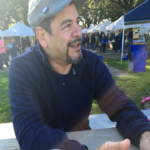 Alfred Solano was raised in Waco and is the Sales Manager for Texas Document Solutions. He and his wife Rachel are passionate about our city’s current trends and future possibilities. Alfred is the Vice President of the Business Resource Center, Waco’s downtown development corporation. He has served on the Board of Directors since its formation in 2011, representing the Cen-Tex Hispanic Chamber of Commerce.
Alfred Solano was raised in Waco and is the Sales Manager for Texas Document Solutions. He and his wife Rachel are passionate about our city’s current trends and future possibilities. Alfred is the Vice President of the Business Resource Center, Waco’s downtown development corporation. He has served on the Board of Directors since its formation in 2011, representing the Cen-Tex Hispanic Chamber of Commerce.
The Act Locally Waco blog publishes posts with a connection to these aspirations for Waco. If you are interested in writing for the Act Locally Waco Blog, please email [email protected] for more information.
By Janae Griffiths
We are all busy people. We go about our days checking tasks off our lists, sometimes putting little thought into what we are actually doing. Often, this is harmless—we get everything done and no one gets hurt in the process. But, for those of us who have the opportunity to walk alongside someone in difficult circumstances or to offer assistance in a unique way, rushing through can do more harm than good.
I had not given this much thought until a few weeks ago, when I met with a wonderful woman named Stella. Stella lives here in Waco, and due to some life circumstances has found herself to be the recipient of multiple social services in our community. She shared with me part of her story—a part that made me uncomfortable. Stella spoke of feeling forced to become her own advocate, of not knowing what resources were available to her or how to tap into them. She felt like she couldn’t find anyone who would take the time to explain the available resources to her.
She told me about how she has sometimes felt like she was just another item to be checked off of someone’s to-do list. She felt like she was falling through the cracks, but had no way to stop it.
“The professionals need to be proactive in spreading information,” she explained. “They need to have the passion to go above and beyond, not just rush through.”
I didn’t know how to respond to her at first. I wasn’t with Stella as she made her way from place to place seeking help. I don’t know how the people working with her actually responded, the words they actually said, the looks on their faces, or the tone of their voices. I don’t know the pressures they were under, or how long their days had been, or even how Stella treated them. I certainly don’t know their intentions. I don’t know if they felt empathy, or annoyance, or kindness, or frustration. I don’t know if they tried their absolute best to help, or if they did indeed feel like Stella was just “another item to be checked off.”
I only know how Stella felt.
“In some places I felt valued, but in many places, I did not,” Stella explained. From her point of view, the people who worked with her seemed to expect that she would automatically know what was available to her, when she felt like no one had ever clarified what services she qualified for and which she did not. She felt uncomfortable and short on information.
As a graduate student at Baylor School of Social Work, I have spent the past two years interning for various Waco nonprofits and working to address needs in our community. One of the key values of the social work profession—which we are taught right at the start of Baylor’s program—is the inherent dignity and worth of every individual. I absolutely believe that every human has dignity and worth, and I am fairly certain that the Waco nonprofit and social service community as a whole believes the same. But, while I may believe those things in my mind, Stella’s story made me start to think about how much more challenging it is to honor those values in my day to day actions.
Of course social service professionals shouldn’t just rush through their work. We all know that. But, in the day in and day out busyness of the work day, it is easy to do.
Fortunately, Stella is a strong woman with a strong personality. She quickly educated herself on the resources available and became an advocate for herself and others that she knew. But, as she pointed out to me, not everyone can easily become their own self-advocate, especially individuals whose primary language isn’t English.
I deeply appreciate Stella sharing her experience with me. I have been reflecting on her words in the weeks since, and they have reminded me about why I entered the field of social work in the first place. I want to be someone who meets people where they are, recognizes them for who they are, and cheers for them as they take steps to become more. My hope is that I, as a member of the social service community in Waco, can approach my work with a renewed sense of the dignity and worth of each individual I have the opportunity to serve. My hope is that I never rush through my work, but take the time to treat each client with kindness and offer as much assistance as I am able.
I hope that I always remember Stella and how she feels. I hope I always remember how uncomfortable it feels not to have the information you need, how bad it feels to be treated like “another item on the list,” how scary it feels to be “falling through the cracks.” I hope that my actions with each person who comes my way will reflect the values I so fervently believe.
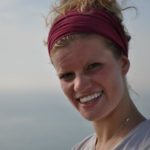 This Act Locally Waco blog post was written by Janae Griffiths. Janae is originally from Chicago, but has been happy to call Waco her home for almost six years! She is finishing her Master of Social Work degree from Baylor University, and currently interns at the Texas Hunger Initiative. She is passionate about issues of poverty and justice, especially in our community.
This Act Locally Waco blog post was written by Janae Griffiths. Janae is originally from Chicago, but has been happy to call Waco her home for almost six years! She is finishing her Master of Social Work degree from Baylor University, and currently interns at the Texas Hunger Initiative. She is passionate about issues of poverty and justice, especially in our community.
The Act Locally Waco blog publishes posts with a connection to these aspirations for Waco. If you are interested in writing for the Act Locally Waco Blog, please email [email protected] for more information.
By Carrie Kuehl
A ribboned birthday gift and the contents of your front seat fly onto the floor as you slam on the brakes to avoid hitting the car in front of you that just slammed on its own brakes. A squatty, blond dog with long ears squeals with the heavy bump of the car’s tire. He dashes to the safety of a front yard, still crying and licking at his paw. He has a bruised shoulder and skinned back foot. You are late for the party, but it’s no big deal.
Sleep has become a rare luxury since the pregnancy. Your toddler is teething and inconsolable. As the two of you finally doze off, two toms and a female begin vocalizing with mating wails which are heard outside the kitchen window, throughout the subdivision, and in the ears of your baby. Sigh…another chance to sleep will come tomorrow night; it’s no big deal.
The ambitious, dream-filled couple from Ohio are trying to decide: will they relocate to Waco or to Greenville, S.C.? They have good job possibilities in both. After a smooth flight they drive along Lake Shore Drive in their rental car. A new future is dancing through their minds when they see a dark shape in the road. It’s the contorted body of a beagle mix, similar to his boyhood best friend who was put to sleep in his arms only a few years before. Three blocks later they meet their realtor at charming little house in a neighborhood with big trees and just the kind of character they were hoping to find. The little house is so cute they almost don’t notice the thick, fluffy dog nosing through garbage and strewing it all over the yard next door and into the street. They do wrinkle their noses a little when the animal waste stench from a porch and yard across the street wafts into their nostrils. The real estate agent dismisses this as common. The couple decides to pursue the opportunity in Greenville. “Drat! I really thought we had them!” the realtor thinks as she hangs up the phone after hearing the news. “Oh well, you can’t win’em all. It’s no big deal.”
If you are still reading, you are likely an animal lover, or even if you aren’t, you have a deep concern and a strong sense of ownership for the future of Wacotown.
In 1988 a group of similarly concerned and dedicated Wacoans got frustrated with the neglect and suffering of animals and the negative effect this neglect was having on our city. When they found they could not get ahead of the problem by spending their free time cleaning poop at the animal shelter, this visionary group took the initiative to begin a spay/neuter program. The goal of this program was to prevent the suffering and dying of unwanted animals by preventing the births of unwanted litters.
That was a quiet year for spay/neuter. The clinic was only open one day a week back then, and they performed about 15 surgeries for cats or dogs a day. Today at the Animal Birth Control Clinic it is common for our licensed veterinarians and supportive staff of veterinary technicians to perform over 50 high-quality, affordable spay and neuter surgeries a day, five days a week. Back then huge numbers of cats and dogs poured into our rescue centers and into the shelter by the dozens daily, now the daily intake rarely goes over 25. And to top it off, our community just celebrated its third month of No Kill (90% or more of the animals exit alive)!
This decreased intake has been made possible because of a perfect mix of donor and taxpayer-funded spays and neuters, and because of transparent communication among goal-focused partners. We all benefit from the safer living and higher quality of life that is the result of this reduced burden on our community.
The next step is upon us. The shelter is being reconstructed to properly care for the remaining cats and dogs who find themselves in need of temporary care. The community campaign, heartily led by Mayor Malcolm Duncan, is wrapping up within weeks. I welcome you to contribute to this project and to support spay/neuter.
The reasons to support spay/neuter and to continue to lift this burden on our community are tangible and intangible, direct and indirect. Here are a few:
- To enjoy your afternoon birthday party rather than having it derailed by a car accident because the car in front of you hit a stray,
- To have a peaceful night of sleep and sanity for yourself and your toddler because the feral cat mating “opera” has been taken off of the marquee,
- To woo young professionals to our Waco neighborhoods instead of giving them a reason to start their bright futures elsewhere.
Quality of life and safety for humans intersects with the lives of the cats and dogs in our city more often than we sometimes realize. This work must continue. It IS a big deal, and it affects us all!
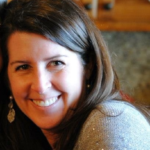 This Act Locally Waco blog post was written by Carrie Kuehl. Carrie is an enthusiastic Wacoan who began her time at the Animal Birth Control Clinic as a volunteer in 1994. Her BA in Sociology from Baylor, ten years in the financial planning/securities industry, and her passion for the efficiency of spay/neuter prepared her to become the Executive Director of ABC in 2006. In the last few years, Carrie has enjoyed growing the clinic and mentoring additional Texas communities to boost their spay/neuter impact. In her personal time, she enjoys kayaking, houseboating, and being an aunt.
This Act Locally Waco blog post was written by Carrie Kuehl. Carrie is an enthusiastic Wacoan who began her time at the Animal Birth Control Clinic as a volunteer in 1994. Her BA in Sociology from Baylor, ten years in the financial planning/securities industry, and her passion for the efficiency of spay/neuter prepared her to become the Executive Director of ABC in 2006. In the last few years, Carrie has enjoyed growing the clinic and mentoring additional Texas communities to boost their spay/neuter impact. In her personal time, she enjoys kayaking, houseboating, and being an aunt.
The Act Locally Waco blog publishes posts with a connection to these aspirations for Waco. If you are interested in writing for the Act Locally Waco Blog, please email [email protected] for more information.
By Nick Haynes
When I think about it, I never had strong aspirations of living the American Dream. The ideals of Life, Liberty, and the Pursuit of Happiness were simply words that I, like many other people born in the United States, always took for granted. It was not until those “rights” were stripped away that I even noticed that I ever had them, and that I was privileged – privileged not because of anything I have done, but because of where I was born and the color of my skin.
There are those among us who do not take the American Dream for granted. Those who were not born into privilege, or those who were born, let’s say, in Mexico. There are people who are born and live their lives in countries and situations in which they constantly face great difficulty and lack of any opportunity. Some of these people sacrifice everything to travel to the United States which, in theory, is a land of opportunity. I say sacrifice because no matter how difficult one’s circumstances, it is always a sacrifice to leave your home, your family, your culture, your language to go to a place where no one knows you, no one likes you, and no one speaks your language – simply so you can put food on the table. It is truly desperation that drives people to emigrate from their homeland to seek out new possibilities.
This is my wife’s story, and now my story as well. My wife was born in Mexico. Like any other little girl she grew up going to school, playing (and fighting) with her sisters, and putting dresses on dolls. She wanted to be a teacher when she grew up. She had a blackboard which she used to teach her make-believe students. Then one day, shortly after the implementation of NAFTA, her dad lost his job. For several months, the family coped with his unemployment with the little money he earned from selling lotions on the street. But this was no way to support a family of five. Eventually, my wife’s father made the courageous, but difficult decision to move to the United States for work. They had applied for a visa several months earlier, but the wait was more than 20 years – so he came anyway, without a visa. After a year of separation, my wife’s parents made the most difficult decision of their lives. Her mom packed up the family (I say packed because it is a common expression – they actually came with nothing), said goodbye to friends and loved ones, and made the long, dangerous journey to the United States. They hired a man to take my wife, her mother and two sisters across the river, and deliver them to their new home in Waco, Texas. This man could have abused them, robbed them, or abandoned them, which happens to so many families – my wife was fortunate. And so began their glorious life of living in the shadows in the land of opportunity.
Living in the United States was not easy. My wife was ridiculed because she couldn’t speak English. She was told that she always had to lie, always had to hide her true situation. Needless to say, the life of an undocumented teenager trying to stay under the radar is a lonely and isolated life. But the family was together, and they had food to eat. My wife grew up in the Waco school system. She eventually learned to speak English, perfectly. In order to survive she had to work. In order to work, she had to claim that she had work authorization. She eventually went to college, earned an associate’s degree, and began attending church. This is where I come in.
My wife and I met in the spring of 2006 through a small group in our church. We fell in love, and were married in May 2007. Like many other naïve Americans, I was under the impression that if an immigrant, like my wife, married a U.S. citizen, like myself, then she could automatically become a U.S. citizen too. How wrong I was. The problem is that our immigration system is antiquated, broken, and incredibly complex. To make a long story short, my wife was eventually able to become a Legal Permanent Resident. Although, it was an arduous journey which forced us to endure 3 months of separation while she was sent back to Mexico as part of this process. Because of my wife’s status, she can now work legally, have a driver’s license and a mortgage; our lives are fairly normal.
The problem came when we applied for my wife to become a U.S. citizen. We have now been told that because of a box my wife checked on a form when she was working without authorization she cannot become a U.S. citizen, and will eventually be deported. There is no option; she will never qualify for any type of immigration benefit in the United States without a change in the law. Let me be clear about the brokenness of our immigration system: if my wife had robbed a bank, there might be a path for her. If she had murdered someone, there is a way for her to still become a U.S. citizen. But because she did what she had to do, and went to work to put food on the table for her family, in the only land she calls home, where she was raised from childhood, she will never be able to become a U.S. citizen. Our family now faces eventual exile. When we have children, they will be U.S. citizens, but their mother still will face deportation. Despite being a U.S. citizen, I am not free. I cannot live the American Dream. It is difficult to describe, but try to imagine if you can. Though we try our best to live normal lives, the fear and threat of separation and deportation constantly hangs over our heads.
Just for the record, I am unconditionally committed to my wife, and I have absolutely no regrets about loving and spending my life with this woman. That being said, when she is deported I will be deported as well. That means no more holidays with family. We may lose our house, our jobs, and everything we hold dear, except each other. Unfortunately, our story is not unique. Today in the United States thousands, if not millions, of U.S. citizens and their immigrant families are dealing with our broken immigration laws. Wives are being taken from their husbands and parents from their children due to deportation. Our immigration system is broken and it needs to change.
My challenge to you: When you think about immigrants, think about my wife and our story. Think about how this problem is affecting our community. We are your neighbors, your coworkers; we worship beside you in church. Waco, Texas is our home. Also, think about why it is that you may be deserving of the privilege of U.S. citizenship and others may not. What did you do to earn your citizenship? My wife has done everything to earn hers – I have done nothing. Finally, contact your representatives in congress: U.S. Representative Bill Flores – (254) 732-0748; Senator Ted Cruz – (512) 916-5834; Senator John Cornyn – 512-469-6034. Tell them to fix our broken immigration system, to stop separating families, and to allow people like my wife to become U.S. citizens so they can stay in the only land they call home.
To keep up to date with immigration advocacy work in Waco, join our page on Facebook: Waco Immigration Alliance.
 This Act Locally Waco blog post was written by Nick Haynes. Nick moved to Waco, Texas to attend Baylor University in the year 2000 where he earned a Bachelor’s degree in International Studies, and eventually earned a Master’s degree in Social Work. Nick has worked as a Social Worker in Waco for the past 5 years. Nick recently ran for U.S. Representative here in Waco to fight for immigration reform and for others in need of change. He now works at Baylor University. Eloisa immigrated to the United States from Mexico and has lived in Waco for 20 years. Eloisa eventually went on to earn her Bachelor’s degree in Business, and is now working on a Master’s degree at Baylor University. Eloisa also works full-time at Baylor. Nick and his wife, Eloisa, have been married for 8 years. They do not yet have children, but they have a 5 pound Yorkie named Poptart. Nick and Eloisa both attend Antioch Community Church.
This Act Locally Waco blog post was written by Nick Haynes. Nick moved to Waco, Texas to attend Baylor University in the year 2000 where he earned a Bachelor’s degree in International Studies, and eventually earned a Master’s degree in Social Work. Nick has worked as a Social Worker in Waco for the past 5 years. Nick recently ran for U.S. Representative here in Waco to fight for immigration reform and for others in need of change. He now works at Baylor University. Eloisa immigrated to the United States from Mexico and has lived in Waco for 20 years. Eloisa eventually went on to earn her Bachelor’s degree in Business, and is now working on a Master’s degree at Baylor University. Eloisa also works full-time at Baylor. Nick and his wife, Eloisa, have been married for 8 years. They do not yet have children, but they have a 5 pound Yorkie named Poptart. Nick and Eloisa both attend Antioch Community Church.
The Act Locally Waco blog publishes posts with a connection to these aspirations for Waco. If you are interested in writing for the Act Locally Waco Blog, please email [email protected] for more information.
By Peaches Henry, Ph.D.
As I watched the historic re-enactment of the Selma marches two weeks ago, my celebration was bittersweet. At a time when we should be celebrating the 50th anniversaries of the victories of the Civil Rights Movement of the 1960s, we are instead watching many of the greatest milestones of the twentieth century erode. While it was deeply moving to honor titans of the Civil Rights Movement of the 1960s such as Representative John Lewis and civil rights strategist Diane Nash, it was deeply disheartening to think of the moves on the state and federal level to turn back the clock. The very law made possible by the sacrifices that occurred on the Edmund Pettis Bridge in 1965 was gutted by the US Supreme Court in 2013. Almost immediately after the Supreme Court ruling, the state of Texas enacted laws with the intent and effect of making voting difficult or impossible for minorities, seniors, and poor people.
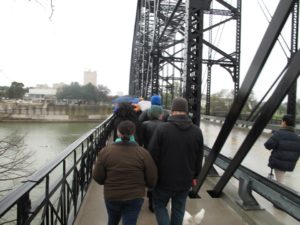
The Waco McLennan County NAACP organized a march across the Washington Street bridge in Waco to commemorate the Selma to Montgomery March for Voting Rights in 1965.
As I thought about what I could do as an individual to ensure that our country does not go back to the days when African Americans were not full citizens of this country, the National Association for the Advancement of Colored People (NAACP) was an easy choice for me. The NAACP has been fighting for the rights of all people since its founding in 1909. It was there during the Civil Rights Movement of the 1960s. It provided funding and lawyers for Martin Luther King, Jr. and the leaders during the Selma marches. And the NAACP has never stopped fighting on behalf of African Americans. Since the shooting of unarmed teenager Michael Brown in August 2014, the NAACP has been on the ground in Ferguson, Missouri. The NAACP is in court fighting Texas’s voter identification law.
The Waco NAACP chapter has a nearly eighty-year legacy of working in the Waco-McLennan community. It has been the voice of social justice in this area since its founding in 1936. As president of the Waco NAACP, I am committed to fighting back against those who seek to destroy or diminish the civil rights of any person. The chapter intends to address the economic challenges facing area families including the prevalence of food deserts in the city, lack of good-paying jobs, and lack of good public transportation. We are going to work with local school districts and families in pursuit of academic excellence for our children. We intend to advocate for, support, and provide resources for our families in the community with accountability for all stakeholders to ensure high quality education for all children. In light of the unjustified killing of African-American boys and men in Ferguson, Staten Island, Ohio, and other places, the chapter will focus on racial profiling, legal protection and treatment by police, and police/community relations.
There is a new Civil Rights Movement on the horizon and it’s being led by young people. It was the youth advocates of Ferguson who continued to protest long after the media had lost interest until the Department of Justice’s report vindicated what they had been telling the country. It is the youth all over this country who are learning how to develop and lead successful campaigns to bring about real change in their communities. The Waco NAACP is going to learn from these young people. We are going to sit down with them and let them teach us. Indeed, we are going to follow them and let them lead us.
Justice is not a black, white, or brown issue. Justice is a moral issue. Protecting the civil rights of all people is a moral decision. It should be a fight that all people who believe in doing right should be prepared to undertake. The NAACP was founded by a multi-cultural group of individuals of different races, ethnicities, religions, ages, and socio-economic backgrounds. We invite everyone who believes in justice for all to join the NAACP in this ongoing struggle.
Come join the oldest and largest civil rights organization in the nation in the fight for justice. We meet on the fourth Monday of each month at 6:30PM at the Texas Ranger Hall of Fame Education Center. Contact the Waco NAACP at [email protected].
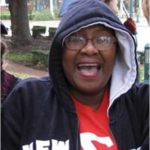 This Act Locally Waco blog post was written by Dr. Peaches Henry. Dr. Henry is a graduate of the University of Texas. She received both her master’s and doctorate in English from Columbia University in New York. She is an English Professor at McLennan County Community College. She is the current president of the Waco McLennan County branch of the NAACP.
This Act Locally Waco blog post was written by Dr. Peaches Henry. Dr. Henry is a graduate of the University of Texas. She received both her master’s and doctorate in English from Columbia University in New York. She is an English Professor at McLennan County Community College. She is the current president of the Waco McLennan County branch of the NAACP.
The Act Locally Waco blog publishes posts with a connection to these aspirations for Waco. If you are interested in writing for the Act Locally Waco Blog, please email [email protected] for more information.
By Veta L. Reed, President of Waco Alumnae Chapter of Delta Sigma Theta Sorority, Inc.
“Faith is the first factor in a life devoted to service. Without it, nothing is possible. With it, nothing is impossible.”—Mary McLeod Bethune
This must have been the motto that motivated the twenty-two dynamic founders of Delta Sigma Theta Sorority, Inc. Our sorority is an organization of college educated women committed to public service with a primary focus on the black community. It is the goal of the Waco Alumnae Chapter to provide assistance and support in our local community. Educational development, one of our Five Point Programmatic Thrusts, is a focal point of our chapter. We have long been a Partner in Education to South Waco Elementary School. Just last week, we awarded a student at the school a $25 first place award for her essay entitled, “Why Education is Important to Me.” The purpose was two-fold: to encourage thoughts about the importance of going to school and learning, and to stress the importance of creative writing. Three to four times during the school year, Waco Alumnae presents every pre-k to first grade student at South Waco Elementary with a book to build their home library, this is especially for economically disadvantaged students who may not have many books at home. The purpose is to stress the importance of reading and the joy books can bring to students.
Studies have shown that the color red stirs anger in students, so Waco Alumnae sponsored a Red Shirt Exchange in which students brought their red shirts to school in exchange for more subtle colored shirts provided by our chapter. We have provided school uniforms for South Waco Elementary to have on hand in the event of an accident or in case parents could not provide uniforms for their child.
As Waco Alumnae we do not limit our community service to just the students. We provide encouragement to the teachers and staff as well by providing treats in the teachers’ lounge and ‘Krash Kits’ for each teacher containing toiletries, snacks, water, etc. Just last fall, Waco Alumnae was recognized by the Waco School Board as an outstanding Partner in Education! We are committed to public service through educational development and will continue to be for, as Albert Einstein said, “Only a life lived in the service to others is worth living.”
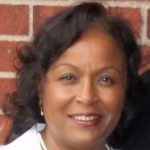 This Act Locally Waco blog post was written by Veta Reed. Veta is a 40-year member of Delta Sigma Theta Sorority, Inc., and has been a member of the Waco Alumnae Chapter since 1976. She has been the president of the chapter since July, 2014. In her professional life, she is a speech therapist having worked 32 years with the Waco ISD. She retired in 2007 from the district and continues to work as a contract speech therapist when needed. In her leisure time, Mrs. Reed enjoys sewing, reading, and spending time with her family. She is the wife of Charles E. Reed, former Vice President of Student Services at TSTC, who also retired in 2007. She is the mother of two sons—Donovan, the controller for Anheuser-Busch InBev in Houston and Ryan, staff accountant for Lorena ISD.
This Act Locally Waco blog post was written by Veta Reed. Veta is a 40-year member of Delta Sigma Theta Sorority, Inc., and has been a member of the Waco Alumnae Chapter since 1976. She has been the president of the chapter since July, 2014. In her professional life, she is a speech therapist having worked 32 years with the Waco ISD. She retired in 2007 from the district and continues to work as a contract speech therapist when needed. In her leisure time, Mrs. Reed enjoys sewing, reading, and spending time with her family. She is the wife of Charles E. Reed, former Vice President of Student Services at TSTC, who also retired in 2007. She is the mother of two sons—Donovan, the controller for Anheuser-Busch InBev in Houston and Ryan, staff accountant for Lorena ISD.
The Act Locally Waco blog publishes posts with a connection to these aspirations for Waco. If you are interested in writing for the Act Locally Waco Blog, please email [email protected] for more information.
by James Gooden
As it is written: “Feed a man and he will eat for only one day; teach him how to fish and he will eat for a life time.” Sometimes I think of this familiar expression when I am considering the importance of Neighborhood Associations…
Why is it important to have a Neighborhood Association? In today’s times our communities face many social struggles. In response to these struggles — we have to learn to water our own grass. Every community has a duty to show development and to improve the quality of existence. The only way that can occur is to become a part of city government. Neighborhood Associations are a way to participate in city government. The Neighborhood Association gives you a voice in the development of your living space, better known as your community.
Neighborhood Associations are organized for a reason — to show unity among the residents of the community, and to make sure the needs of the community are addressed. Imagine you have identified a need in your community… there are a series of steps that you can take to insure that you are heard and that your specific need is addressed by the city government. The Neighborhood Association can make this happen, but you have to participate.
For example, it’s kind of like when you send someone to the store and say “Bring me something back.” When that individual arrives back you may find yourself saying, “That’s not what I wanted.” That same principal applies with community development. The only difference is – if you don’t participate in community development, you just might not get anything back at all. As individuals in the community we know better than anyone what our specific needs and wants are for the areas in which we live. Who represents you better than anyone? YOURSELF! If your thoughts and concerns for your community are not expressed, then how can you expect someone to know what your needs are? They won’t! Consider also that the thoughts and wishes that you have for your community may be shared by others.
Here’s another familiar expression: “Everyone wants to go to the party but, no one wants to dance!” Sometimes you have to step out of your comfort zone to let someone know that you are willing to be part of the solution and not part of the problem. When you look around and see all the other parts of the city developing and growing by leaps and bounds, and your community is stuck and being held down, then it’s time to take action and do something about it. Stop watching progress and development pass you by; it’s time to water our own grass! The key to having a beautiful lawn and making sure that the grass is green and grows properly, is the fertilizer we use. In this case, your active role in the growth and development of your community is the fertilizer that’s needed. Don’t sit around and wait for something to happen, get involved and make it happen! Remember: if you pay taxes, you don’t work for the city government; the city government works for you. Make a pledge not only to the community but, to yourself: get involved and have an active voice in the things that happen in the community in which you and your family live.
In closing, I would like to say, unless it is organized, a neighborhood is incapable of looking after its interests and dealing with basic American political and economic institutions. By banding together, residents can overcome these handicaps. No neighborhood can match the lobbying budget of a major company, but a neighborhood organization can have influence by making a positive use of the many residents within its community. By organizing, neighborhoods can transform the perceptions of the people who own resources from seeing a neighborhood as a liability to seeing it as an asset.
The grass is not always greener on the other side. That’s why it is very important to… what?
WATER YOUR OWN GRASS!!!
 This Act Locally Waco blog post was written by James Gooden. Born and raised in Waco, Texas, James spent the past 20 plus years in Tulsa, Oklahoma. He has returned home to Waco to care for his elderly mother. While in Oklahoma, he was the Director of Field Services for Advanced Home Health Care Services. James attended Texas Southern University in Houston, Texas, and is a graduate of University Center of Tulsa. During his stay in Tulsa, James worked with several volunteer organizations including The Tulsa Boys Home, Light House for the Blind, and reading to preschool kids during story time. At the present time he spends his time working with the community and looks forward to his next adventure in life. James, attributes his love for volunteering to his parents: his father, the late James W. Gooden, and his mother, Ethel Gooden, who is still fighting for community causes. James is a graduate of The Leadership Plenty Institute, class of 2014-2015. He is Co-chair for the Education/Presentation task group of Citizens for Responsible Lending and is involved in a host of other community interests.
This Act Locally Waco blog post was written by James Gooden. Born and raised in Waco, Texas, James spent the past 20 plus years in Tulsa, Oklahoma. He has returned home to Waco to care for his elderly mother. While in Oklahoma, he was the Director of Field Services for Advanced Home Health Care Services. James attended Texas Southern University in Houston, Texas, and is a graduate of University Center of Tulsa. During his stay in Tulsa, James worked with several volunteer organizations including The Tulsa Boys Home, Light House for the Blind, and reading to preschool kids during story time. At the present time he spends his time working with the community and looks forward to his next adventure in life. James, attributes his love for volunteering to his parents: his father, the late James W. Gooden, and his mother, Ethel Gooden, who is still fighting for community causes. James is a graduate of The Leadership Plenty Institute, class of 2014-2015. He is Co-chair for the Education/Presentation task group of Citizens for Responsible Lending and is involved in a host of other community interests.
he Act Locally Waco blog publishes posts with a connection to these aspirations for Waco. If you are interested in writing for the Act Locally Waco Blog, please email [email protected] for more information.
By Crystal Hernandez
Hi. It’s nice to meet you. We’re the YMCA of Central Texas.
Many folks in Waco have never been formally introduced to the YMCA of Central Texas. First impressions or chatter among friends often portray the Y as just another gym, a place to don spandex, pound out a mile or two on the treadmill, knock out a couple of reps on the weights or swim a few laps.
When you join the Y, though, you belong to more than a gym although we do have a great gym. When you join the Y, you join a community. We’re a gym with a mission — a mission to put Christian principles into practice through programs that build healthy spirit, mind and body for all. Our mission governs all we do. Here’s how.
We are for you. We are for your neighbor. We are for your child. We are for the healthy and those struggling to reclaim their health. We are for those that love spandex and those who hate it. We are for everyone. At the Y, a supportive community and friendships are a big part of wellness. At every age and every activity level, you’ll find people just like you looking to live a bit healthier.
If an expansive cardio and weight area are what you’re looking for, we have it. Between our two branches (Doris Miller Family YMCA and Waco Family YMCA) we offer more than 100 land-based group exercise classes each week. If you’re more of a water baby, we offer group exercise classes in our pools, too. (By the way, we have five pools). From Zumba® to yoga, from Insanity® to Aquatic Boot Camp, we have a class for everyone.
We don’t stop there, though. We believe that everyone is entitled to better health, and we want to help. Here are some examples of some of our special programming that helps build up the health of our community:
- LIVESTRONG® at the YMCA, a free 12-week program, helps adult cancer survivors reclaim their total health and find a community of support.
- Our children’s health is important, too. Kids ages 7-13 who are above their healthy body can enroll, along with their caregivers, in MEND (Mind, Exercise, Nutrition, Do it!). The dynamic and engaging curriculum of this free 10-week program guides kids toward healthier eating and a more active lifestyle.
- The safe, low-impact exercises of Enhance®Fitness improve endurance, strength, balance and flexibility among those with arthritis.
- The YMCA’s Diabetes Prevention Program is a 12-month lifestyle behavior intervention that is part of the CDC-led National Diabetes Prevention Program. It helps those at high risk of developing type 2 diabetes adopt and maintain healthy lifestyles by eating healthier, increasing physical activity and losing a modest amount of weight to reduce their chances of developing the disease.
Our friendly, knowledgeable staff members are guided by our core values of caring, honesty, respect and responsibility. We’re here to do more than help you reach your goals; we’re here to build a relationship with you. If you’re a gym rat, we’ll cheer you on! If you’re new to the fitness world, we’ll take time to get to know you while guiding you in achieving your goals.
And do you want to know one of the most amazing things about the Y? It’s for everyone! The generosity of others is at the core of our existence. It is only through the support of our volunteers and public and private donors that we are able to give back to the communities we serve. We offer financial assistance so that cost is not a barrier to anyone wanting better health. The Y is for community. The Y is for you. You should get to know us. We’d like to get to know you.
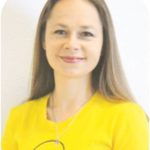 This Act Locally Waco blog post was written by Crystal Hernandez. Crystal is the Healthy Living Director for the Waco Family YMCA. She received her degree in Exercise Science and Health Promotion from the University of Memphis. She’s blessed to be the mother of 3 beautiful children, Norah, Robbie and Sammie and she and husband, Shawn will be adding number 4 to the mix in less than a month. In her free time, she loves hitting the pavement and pounding out a good run.
This Act Locally Waco blog post was written by Crystal Hernandez. Crystal is the Healthy Living Director for the Waco Family YMCA. She received her degree in Exercise Science and Health Promotion from the University of Memphis. She’s blessed to be the mother of 3 beautiful children, Norah, Robbie and Sammie and she and husband, Shawn will be adding number 4 to the mix in less than a month. In her free time, she loves hitting the pavement and pounding out a good run.
The Act Locally Waco blog publishes posts with a connection to these aspirations for Waco. If you are interested in writing for the Act Locally Waco Blog, please email [email protected] for more information.
By Minister Sandra Henry, Book Club Administrator, Pleasant Olive Missionary Baptist Church
As I searched for the words to write this article, the question that I continued to ask myself was, “What is so important about reading?” I took a walk into my past and stopped by my childhood.
 I was born and raised in New York City. Yes, I am very proud of it! New York is a fascinating multicultural city and a child with a vivid imagination can experience many adventures. I have always loved school, books, and the gift of knowledge that they give to everyone who will accept the offer as well as the challenge. As a child, I wanted to travel to faraway places, and reading helped me to imagine I was right there. I liked reading adventure stories like, The Adventures of Tom Sawyer and the Adventures of Huckleberry Finn written by Mark Twain.
I was born and raised in New York City. Yes, I am very proud of it! New York is a fascinating multicultural city and a child with a vivid imagination can experience many adventures. I have always loved school, books, and the gift of knowledge that they give to everyone who will accept the offer as well as the challenge. As a child, I wanted to travel to faraway places, and reading helped me to imagine I was right there. I liked reading adventure stories like, The Adventures of Tom Sawyer and the Adventures of Huckleberry Finn written by Mark Twain.
I have found the most fascinating stories, truth, and adventures to be written in God’s inspired word, the Holy Bible. As we read about the Creation in the book of Genesis, we learn how our universe came into existence. The story of Creation teaches us the value of life and that we are each worth something special. It also teaches us to work with integrity and to rest to enjoy life.
We also learn in the book of Genesis the story of Noah and the Ark. It teaches us to take care of innocent animals and to preserve wildlife. When we look into the sky and see a beautiful rainbow after it has rained, we know it is God’s promise to mankind that He will take care of us and love us always.
As a mother, I encouraged my child to read by reading to him when he was young. Reading became a part of our daily routine, and he was eager for me to read to him before bedtime.
I became involved in book club through Ryn Farmer, a coordinator at the Waco Community Development Corporation (Waco CDC), and through my church, Pleasant Olive Missionary Baptist Church. Ryn met with our Pastor, Dr. Willie E. Clarke, and later our congregation. She shared with us the importance of book clubs and the poor statistics in reading of our children. She touched the hearts of the people in our congregation, including me, and book club was born in our church. Our pastor is now deceased but his vision of book club is still alive in our church.
I became a part of book club because I wanted to encourage children in our community to find the adventures and interests in reading that I did as a child. Reading is a way for each child to reach his or her true potential in their lives. I wanted to be a small part of giving a child every chance to fulfill their dreams.
Reading builds character in children who will one day become adults. It develops empathy in our children toward other people because it allows them to imagine or relate to what others experience.
Reading is so much better than watching TV because reading stimulates the brain, allows us to relax, builds and stores knowledge, improves language skills and vocabulary, and develops a child’s imagination.
How can anyone live in our society and function to their true potential if they do not know how to read? Everything we do has some form of reading attached to it. Yet, there are many people in America who do not know how to read. I find that sad. A country of this magnitude should not have this kind of problem.
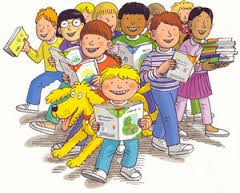 Book clubs are so important to the future of our children. Book clubs encourage and challenge our children to take every opportunity to develop their education and build their character. Book clubs help motivate children to meet their highest potentials.
Book clubs are so important to the future of our children. Book clubs encourage and challenge our children to take every opportunity to develop their education and build their character. Book clubs help motivate children to meet their highest potentials.
Reading empowers our children with the confidence to stretch beyond their limits and to strive to reach their greatest achievements and expectations in their lives.
How about some food for thought…
“A child needs both to be hugged and unhugged. The hug lets her know she is valuable. The unhug lets her know that she is viable. If you’re always shoving your child away, they will cling to you for love. If you’re always holding them closer, they will cling to you for fear.” — Polly Berrien Berends
“For I know the thoughts that I think toward you, says the Lord, thoughts of peace and not of evil, to give you a future and a hope (JEREMIAH 29:11 NKJV).”
“Train up a child in the way he should go, and when he is old he will not depart from it (PROVERBS 22:6 NKJV).”
Reading is forever! Give a child the gift of reading!
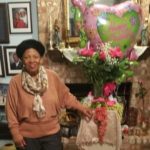 This Act Locally Waco blog post was written by Minister Sandra Henry. Min. Henry serves as an associate minister at Pleasant Olive Missionary Baptist Church in Waco, Texas. She has served at Pleasant Olive for over twenty years. She and her church developed the Book Club and Mentorship Program at J. H. Hines Elementary School with the help of Ryn Farmer, Waco Community Development Center Coordinator in the last school year of 2013-2014. Min Henry preached her first sermon at the New American International Baptist Institute and Seminary in Harker Heights, Texas in December 2012 and received her license in March 2013 at Pleasant Olive. She received her Master of Theology and Doctor of Theology at NAIBI Seminary. She is an honorably discharged veteran from the United States Army with four years of active service. Min Henry and her husband, Joseph Henry, relocated to Waco, Texas in 1985 after he retired from the United States Army with 20 years of service. Min Henry is retired from Department of Veterans Affairs Regional Office with twenty-four years of service. They have four children, five grandchildren and two great grandchildren. Bro and Min Joseph Henry love the Lord and they serve Him together. Min Henry’s focus is a faithful and humble servant rooted in the word of God.
This Act Locally Waco blog post was written by Minister Sandra Henry. Min. Henry serves as an associate minister at Pleasant Olive Missionary Baptist Church in Waco, Texas. She has served at Pleasant Olive for over twenty years. She and her church developed the Book Club and Mentorship Program at J. H. Hines Elementary School with the help of Ryn Farmer, Waco Community Development Center Coordinator in the last school year of 2013-2014. Min Henry preached her first sermon at the New American International Baptist Institute and Seminary in Harker Heights, Texas in December 2012 and received her license in March 2013 at Pleasant Olive. She received her Master of Theology and Doctor of Theology at NAIBI Seminary. She is an honorably discharged veteran from the United States Army with four years of active service. Min Henry and her husband, Joseph Henry, relocated to Waco, Texas in 1985 after he retired from the United States Army with 20 years of service. Min Henry is retired from Department of Veterans Affairs Regional Office with twenty-four years of service. They have four children, five grandchildren and two great grandchildren. Bro and Min Joseph Henry love the Lord and they serve Him together. Min Henry’s focus is a faithful and humble servant rooted in the word of God.
The Act Locally Waco blog publishes posts with a connection to these aspirations for Waco. If you are interested in writing for the Act Locally Waco Blog, please email [email protected] for more information.
By Rachel Wilkerson
…an Ivy League Graduate
“You’re a junior, Rachel?” asks Dale.
“Yep.”
“So you’d be about twenty. Know where I was when I was twenty?”
I take a stab, “College?”
“Vietnam. Then I went to Cornell. They say it’s a half-decent place, but I think they might just be saying that.”
That was my introduction to Dale Schirrmacher. The Gospel Cafe was the sort of place where, like Alice’s white rabbit, I believed as many as half a dozen impossible things before breakfast. There was a fellow named Virgil who swept in every weekday wearing a turban and a robe, and half of our regulars claimed he had parted Lake Waco the way Moses parted the Red Sea. If someone had come in and claimed to be Bobby Fisher, I would have reeled off the day’s pie offerings the same as I did for everyone. So when this particular Vietnam vet wearing a red cap and mangy assortment of t-shirts claimed to be an Ivy League grad, I dismissed the claim faster than I could return with the slice of banoffee pie.
…a diabetic
Banoffee—a hearty can of dulce de leche nestled in a graham cracker crust topped with sliced bananas and whipped cream—was always in hot demand at the Gospel Cafe. When I extended the slice to Dale, he replied with, “Nah, it’s for you. I don’t eat that stuff.” I don’t know why I said okay and sat down. Maybe I had read Isaiah 58’s “extend your soul to the hungry.” Maybe I was tired that day or had a hankering for a post-lunch sugar coma. I suppose I couldn’t think of a good enough reason not to eat pie. So I sat down at the table. That exchange of pie and conversation marked the beginning of my unexpected friendship with a homeless diabetic in Waco.
There aren’t very many people who have read the entirety of my undergraduate thesis on Hopkins and poetry, but Dale did. He edited my paper on the suffering of Children in Dostoyevsky’s Crime and Punishment. Dale didn’t carry many papers around—his identity, disability, and Lone Star card—but I remember him pulling that dog-eared, marked copy of my paper in and out of the sleeve of his rain jacket, sheltering it from the elements like it meant the world.
…an alcoholic
The day I learned why Dale was on the streets was the day that he came into the cafe with clouded eyes, aggressive cheerfulness, and a liquor-shaped bottle in a brown bag cradled in a towel. Another volunteer, Bill, helped Dale into a chair, and I went through the lunch line for a plate of fried chicken, green beans, and a plate of salad with bleu cheese, wiping tears on the back of my shirt sleeve.
Bill saw my distress and responded to my query of “Why” with “Oh dear heart, that’s just how it is.” He explained how the first of the month—the arrival and subsequent exhaustion of benefits — lasts three days. For three days Dale and company would buy their own food, yank themselves up by their bootstraps. Following the inevitable brown-bagged incident, on the fourth day everyone would come back, and we would all have fried chicken.
…a CEO of a Fortune 500 company
I left the cafe for a few years—ventured to England for school, worked in Lubbock. By the time that the homing pigeon instincts landed me in Waco again, I found that I resisted the idea of going back to the cafe. I knew in my gut somehow that Dale was gone. One afternoon I walked back in. Nothing had changed and everything had changed. The kids who came to the cafe and ordered hot dogs now had their own kids.
Bill remembered me, and we caught up in between clearing tables and endless sweet tea refills. He told me about how last week they lost one of their own, a man named Dale who came in every day. They buried him in a city grave, no one at the cafe even knew about it. Bill says Dale was an oddity, he was the CEO of an oil company in Houston. One little drink turned into two little drinks, and before you knew it he was on the streets of Waco.
…a father
Bill wonders aloud how they identified Dale’s body. “He has a daughter, who teaches up at Cornell now, the same school he went to. Maybe they got a hold of her?” I figure the daughter’s about my age, an academic, a professor. I think about the disconnect between her and her father, and the disconnects that happen sometimes in the daily strangeness of knowing family members. I needed someone to read and mark my papers; perhaps Dale needed a conversation with a young over-eager academic.
Life rarely ushers in the most formative conversations in your life with fanfare. Instead, I find myself shaped by the seemingly happenstance conversations with unexpected characters. How do we process life—with its twists and turns, its heartbreak and its joys—with our neighbors? My friendship with Dale taught me that sharing pie, conversation, and ultimately sharing moments of our own brokenness, weaves a thread that binds a community of unpredictable characters together.
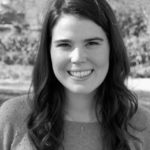 This Act Locally Waco blog post is by Rachel Wilkerson. Rachel works as a data analyst for the Texas Hunger Initiative and lectures at Baylor in mathematics and economics. A staunch advocate for pie as a catalyst for gathering folks together, Rachel thrives on impromptu poetry slams and conversations on front porches.
This Act Locally Waco blog post is by Rachel Wilkerson. Rachel works as a data analyst for the Texas Hunger Initiative and lectures at Baylor in mathematics and economics. A staunch advocate for pie as a catalyst for gathering folks together, Rachel thrives on impromptu poetry slams and conversations on front porches.
The Act Locally Waco blog publishes posts with a connection to these aspirations for Waco. If you are interested in writing for the Act Locally Waco Blog, please email [email protected] for more information.
